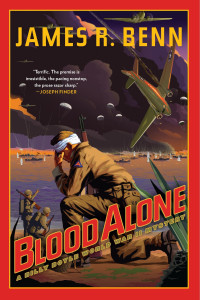 I read and enjoyed the first two installments in James Benn’s Billy Boyle World War II mystery series. I had learned a while ago from Benn himself that he was at work on a third book, so I’ve been on the lookout for it. I read it almost as soon as I got my hands on a copy. And I was definitely not disappointed!
I read and enjoyed the first two installments in James Benn’s Billy Boyle World War II mystery series. I had learned a while ago from Benn himself that he was at work on a third book, so I’ve been on the lookout for it. I read it almost as soon as I got my hands on a copy. And I was definitely not disappointed!
Just a quick recap to get you up to speed. Billy Boyle has just started working as a police detective in his hometown of Boston when the Japanese attack on Pearl Harbor prompts America’s belated entry into the War. Billy’s mother is a distant relative of Dwight Eisenhower’s wife Mamie, and Billy knows the General as “Uncle Ike.” So when Billy enlists, he’s attached to the General’s staff, where he gets to act as an investigator in a number of interesting cases. His closest associates are Diana Seaton, a British woman who works for special Operations Executive, and Lieutenant Piotr Kazimierz (known as Kaz), a Polish aristocrat also serving on Eisenhower’s staff.
The First Wave ends in late 1942, with Allied forces entering North Africa. Blood Alone picks up in the summer of 1943, when the Allies began invading Sicily as a first step toward the subsequent liberation of the rest of Italy. Benn makes successful use of a somewhat unusual narrative approach in Blood Alone. When the story opens, first-person narrator Billy is just regaining consciousness in a field hospital. Suffering from relatively minor head and forearm wounds, he’s also experiencing a pretty severe case of amnesia that has a significant impact on his ability to carry out his orders, since he doesn’t know who he is or what he’s supposed to be doing!!
Most of the action takes place over the period of a very few intense days. Billy slowly reconnects his memories and in the process starts to make sense of both the assignment that brought him to Sicily in advance of the invasion and the events that he witnesses after waking up in that field hospital. I don’t want to give away too much, but I will say that the plot revolves around the (historically accurate) use of Sicilian Americans as agents in pulling off the invasion. Among these was the gangster Lucky Luciano, then imprisoned at Great Meadows Penitentiary, who through third parties was able to make contact with Don Calogero Vizzini, a Sicilian Mafia leader who persuaded thousands of members of the Italian armed forces to surrender to the Allies rather than continue fighting against them. The combination of World War II intrigues with Mafia plots and counter-plots makes for a very exciting story!
I would say without hesitation that another strength of Blood Alone is Benn’s excellent depictions of the island of Sicily, which he visited with his wife while doing background research for this novel. In addition to the fascinating history lesson, I learned quite a lot more than I already knew about the terrain, the climate, the plant life and the buildings on Sicily. As I often say in cases like this, my reading experience would have been enhanced by the addition of a map showing Billy’s travels around the island, but this is a relatively minor quibble.
My only other complaint is that Benn seems to be moving the action forward a little faster than I’d like. These books are enjoyable enough that I look forward to several more installments before the series wraps up!
(Soho Press, Inc., 2008)
